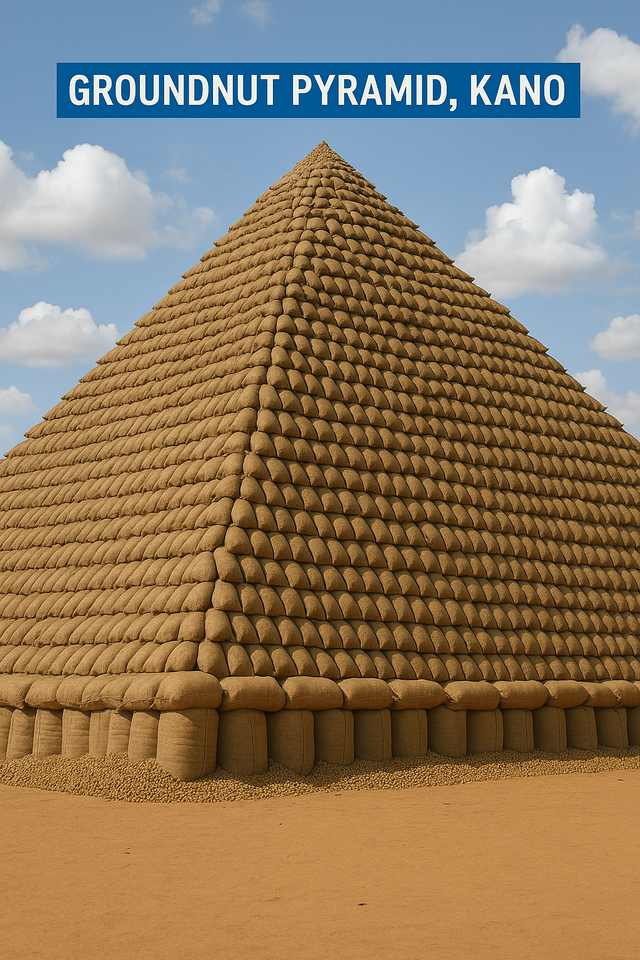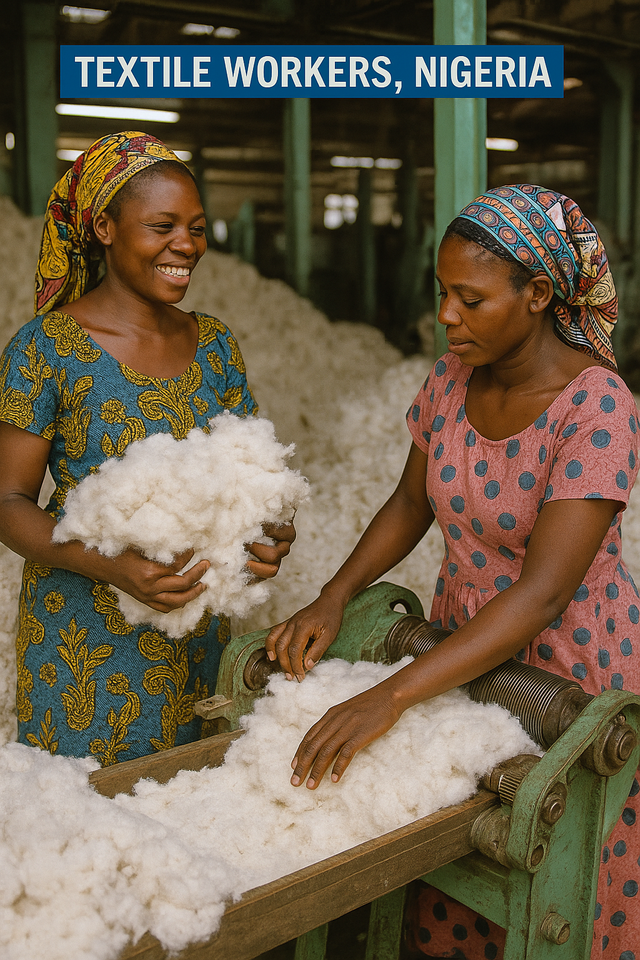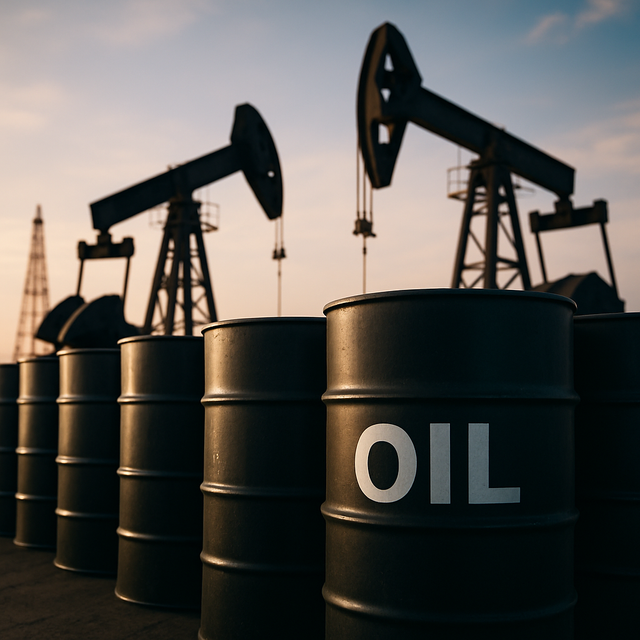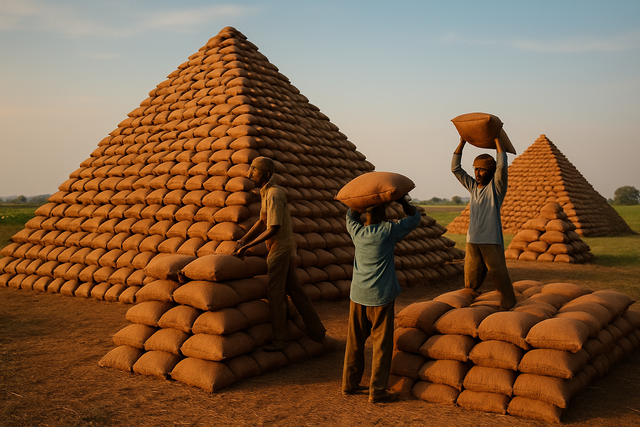"Nigeria Was Not Always Like This"
Nigeria Was Not Always Like This: The Story of How Oil Shifted Our Economy
Nigeria was not always like this — overdependent on crude oil, riddled with fuel subsidy dramas, and unstable prices of food and goods.
There was a time the country was rich in agricultural production and the economy thrived off the land.
The story of Nigeria’s economy didn’t begin with oil — it began with cocoa, groundnut, palm oil, rubber, and more.
We had the Groundnut Pyramid in the North, and cocoa in the West. We were exporting crops and importing very little. The economy was healthy, food was affordable, jobs were plenty, and development felt within reach.
 Groundnut pyramids like this stood tall in Kano and other parts of Northern Nigeria — a symbol of wealth through agriculture.
Groundnut pyramids like this stood tall in Kano and other parts of Northern Nigeria — a symbol of wealth through agriculture.
In fact, agriculture wasn’t just feeding the people — it was fueling the economy. Farmers made a living. Traders built empires around local produce. Textile industries, mining, and crafts also thrived.
 Two Nigerian women working at a traditional textile workshop — a thriving industry before oil dominated the scene
Two Nigerian women working at a traditional textile workshop — a thriving industry before oil dominated the scene
But then came the discovery of oil in the late 1950s. Nigeria officially joined the oil-producing nations in the 1970s, and the first major boom came in the 1980s.
At first, it was a blessing. Revenue increased, foreign investments poured in, and Nigeria was looking like the next big thing.
But slowly, the government started neglecting agriculture and other sectors. Oil became the golden child — everything revolved around it. Schools, healthcare, manufacturing, and most importantly farming, all got sidelined.
Nigeria became known for its oil rigs and tankers — but forgot the sectors that once kept its economy afloat.
Only a few regions in Nigeria had access to crude oil, so while oil money was flowing in, jobs were not.
Unemployment rose. Inflation skyrocketed.
The few refineries built became either abandoned or dysfunctional, and Nigeria — one of the top crude oil producers — now exports raw crude and imports refined fuel at high prices.
Imagine this: we export crude oil → they refine it → we buy it back expensively.
That’s where much of our money goes. Funds that could go into fixing roads, providing education, supporting farming or healthcare are being used to buy what we already produce in raw form.
And this affects every other sector — because when fuel is expensive, food gets expensive, transportation gets expensive... everything does.
 A dramatic sunset over an oil field — symbolizing both wealth and the shadows cast on other sectors of Nigeria’s economy.
A dramatic sunset over an oil field — symbolizing both wealth and the shadows cast on other sectors of Nigeria’s economy.
It gets worse when we think of what could have been. If the country had maintained balance — oil as a blessing, not a replacement — we could have had the best of both worlds.
Let’s not forget:
i. Cocoa from Ondo
ii. Palm oil from Aba
iii. Groundnut from Kano
iv. Rubber from Benin
v. Tin from Jos
vi. Cotton from Katsina and
Millet, cassava, yams, maize — the list is long.
All of these used to contribute significantly to GDP and national pride.
 Agricultural workers stack farm produce in rural Nigeria — reminding us of what once fed and sustained us.
Agricultural workers stack farm produce in rural Nigeria — reminding us of what once fed and sustained us.
So, What Can Be Done?
°Revive agriculture: Provide grants, equipment, and training to young farmers.
°Fix the refineries: So we stop wasting money importing refined oil.
°Diversify the economy: Re-invest in mining, local industries, and export-worthy products.
°Support SMEs: Encourage small businesses in tech, fashion, entertainment, and agribusiness.
°Educate and empower: Make knowledge and innovation a priority, especially in rural communities.
Oil wells might dry up, but before then, let’s do something meaningful with the money and wealth that comes with it — so Nigeria doesn’t drift into becoming a lesser country we can no longer be proud of.
My Final Thoughts;
Nigeria is still rich — not just in oil, but in people, land, history, and talent.
But to truly earn the name “Giant of Africa” again, we must look beyond oil and invest in what we used to be great at.
Let’s return to the soil, support our industries, and stop waiting for oil prices to decide our future.
Upvoted! Thank you for supporting witness @jswit.
I'll advise you remove the pictures as Ai generated texts or pictures aren't allowed on steemit. Delete it before I review your post.
Thank you for the feedback.
I understand and respect the rules of the community. The photos were carefully designed and AI-generated by me, only to help visually support the post where real-life photos are unavailable. But since they’re not allowed, I’ll remove them right away.
I also hope the post remains valuable even without the visuals, and I’d appreciate the chance to learn more about the specific content guidelines so I can do better in future posts.
Please, I’d like to reach out to you directly for some clarity and guidance if that’s okay.
09124583694
You'll have to add visuals that are relative
Thank you sir.
Messaging right away...
Congrats!
You're eligible to use newcomer tag for three months from your joining. Please share your posts on any social media and post the links in comment section of your post.
Curated by: @dove11
Thank you!
Lol, since it is my fourth month, I thought I outgrew the newcomer tag. I will post in X.
Technically yes, but we have April as cut off for this month. Have a nice time.
Thank you for pointing that out. I still have a lot to learn.